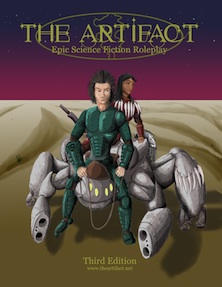I’ve mulled over this question before but now I’m thinking of changing my answer. My first attempt still has a lot of value but it missed the goal.
That’s the point of this post, goals. The way you win an RPG is by achieving goals. Now, that’s really true of most games but they’re goals that are given to you. The difference between those games and RPGs is that you can decide on your own goals to reach out for. The nice thing is that if you’re not sure what you want, the GM or even other players can suggest goals for you.
A stranger approaches you and offers you a grand sum to find the sparkly whozit. Do you take the job?
You can even take the goals offered you while you work on your own. RPGs are very flexible.
Why that’s important
It’s difficult to underestimate how important knowing that achieving goals are the way a player wins. For a while I knew that some players preferred to set their own goals and others were more passive about it but I didn’t realize the value of that.
I knew that some players like the game Fate and some didn’t. I knew that some players have a blast with Fiasco and others thought they would but don’t.
On the flip side some players get bored with more traditional games and they gravitate toward narrative games.
The difference is how they like to set their goals. It’s not that players that like more traditional games don’t set their own goals, it’s just the priority they put on their own goals. They will take up goals presented to them as an avenue to reach their own. Players that gravitate toward more open games prefer their own. They’d rather skip the slog through someone else’s ideas and reach directly for their own.
Preferring one’s own goals tends to be something that players gravitate toward as they become more experienced. They learn about the kinds of experiences they like and want a short circuit to get there. They’ve done zero to hero, now they want to be the hero without the zero. That’s understandable, you don’t usually want to tell the same kind of story over and over.
That doesn’t mean that a player that never takes up narrative games is less experienced. It may be that zero to hero is their favorite kind of story. Maybe they feel that just skipping to the hero part is less satisfying. It’s more a matter of preference.
Its that the large majority of first time players start off not knowing what they want, other than an adventure. As they play, they can sense the gaps in their play experience and want to fill them.
Summing it up
When a prospective player asks “How do you win?” I would answer them like this.
You win by taking up goals and accomplishing them. They can be ones that I’ll offer to you as a GM or if you already know what you want to do, you can set your own goals and work towards them.
There! Nice and concise, it’s a simple answer that assures the player that knows what they want but doesn’t scare the player that is overwhelmed by choice.
Other stuff
In my original post I talked about the game as being collaborative, challenging and social. I think the idea that the players, even the GM collaborate can be reassuring to other players. Some players may like challenges but players like my wife would be turned off by that. Social might attract some but range from unattractive to even scary to some.
They’re selling points that could be used for the right person.


 The Free RPG Blog
The Free RPG Blog